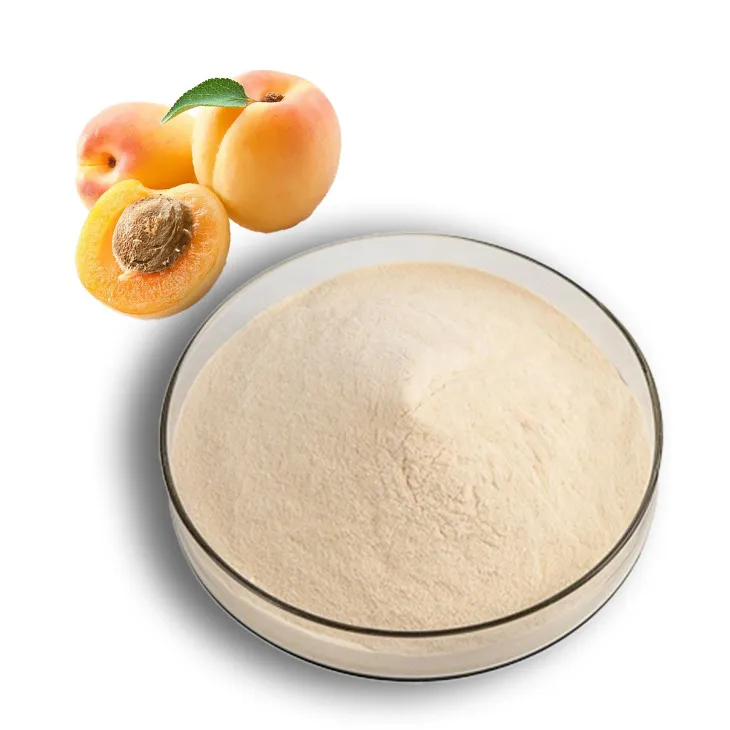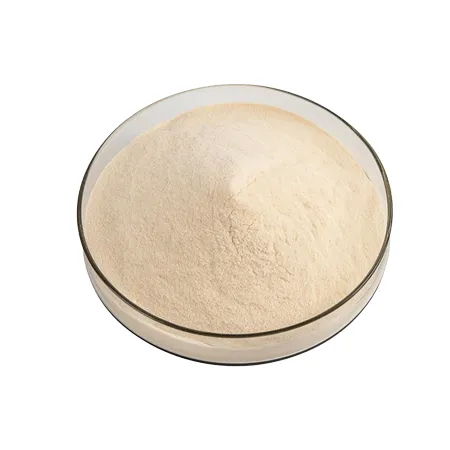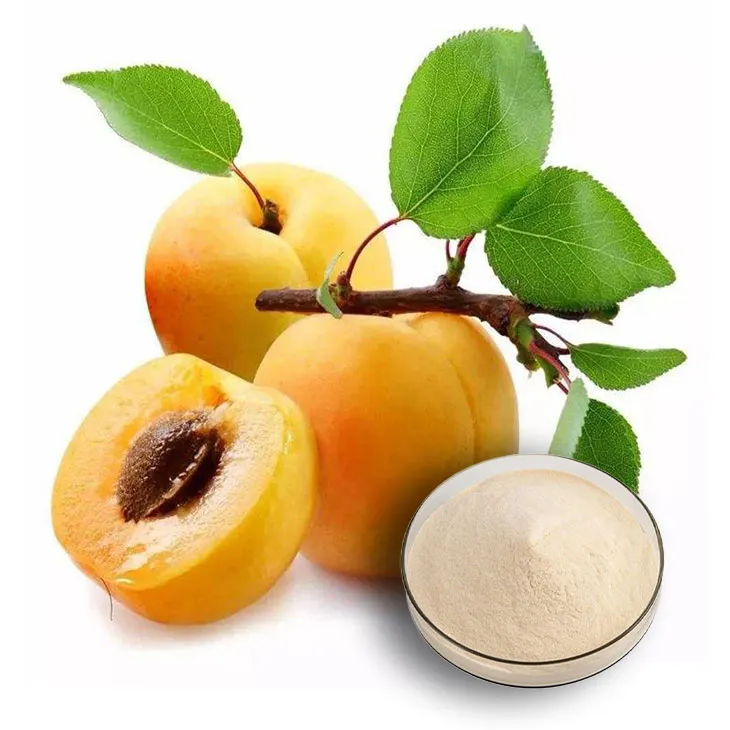- 0086-571-85302990
- sales@greenskybio.com
Supercritical Carbon Dioxide Extraction of Apricot Powder
2024-12-02

1. Introduction
Apricots, with their rich nutritional profile, have long been a valuable source of various bioactive compounds. Apricot Powder, which can be obtained through different extraction methods, has a wide range of applications in the food, pharmaceutical, and cosmetic industries. Among the extraction techniques, supercritical carbon dioxide (CO₂) extraction has emerged as a highly promising method.
Traditional extraction methods such as solvent extraction often face limitations in terms of purity of the extracted product and the preservation of heat - sensitive bioactive components. Supercritical CO₂ extraction, on the other hand, offers a more efficient and environmentally friendly alternative. This process has the potential to revolutionize the extraction of Apricot Powder, leading to higher - quality products with enhanced bioactivity.

2. The Principle of Supercritical CO₂ Extraction
Carbon dioxide, under supercritical conditions (i.e., above its critical temperature of 31.1 °C and critical pressure of 73.8 bar), exhibits unique properties. It has the density of a liquid, which enables it to dissolve substances like a solvent, and the diffusivity of a gas, allowing it to penetrate solid matrices easily.
When used for Apricot Powder extraction, supercritical CO₂ can selectively extract different components depending on the extraction parameters. For example, by adjusting the pressure and temperature, it is possible to target specific bioactive compounds such as vitamins, carotenoids, and phenolic compounds present in apricots.

3. Extraction Parameters
3.1 Pressure
Pressure plays a crucial role in supercritical CO₂ extraction of apricot powder. Increasing the pressure generally leads to an increase in the solubility of the target compounds in supercritical CO₂. For instance, at lower pressures, the extraction efficiency may be limited, and only the more volatile and less polar compounds may be extracted. However, at higher pressures, a wider range of compounds, including those with higher molecular weights and polarities, can be dissolved and extracted.
Typical pressure ranges used in apricot powder extraction are between 100 - 300 bar. The optimal pressure depends on the specific composition of the apricots and the desired components to be extracted. For example, if the goal is to extract carotenoids, a pressure around 200 bar may be more suitable.
3.2 Temperature
Temperature also significantly affects the extraction process. Higher temperatures can increase the diffusivity of supercritical CO₂, which can enhance the mass transfer rate. However, excessive heat can also cause degradation of heat - sensitive bioactive compounds. Therefore, a balance must be struck.
For apricot powder extraction, the temperature is usually maintained in the range of 40 - 60 °C. At these temperatures, the extraction efficiency can be optimized while minimizing the damage to the bioactive components. For example, phenolic compounds, which are important antioxidants in apricots, are relatively stable within this temperature range during the extraction process.
3.3 Flow Rate of CO₂
The flow rate of supercritical CO₂ is another important parameter. A higher flow rate can increase the mass transfer rate by continuously replacing the depleted CO₂ near the surface of the apricot powder with fresh CO₂. This helps to maintain a high concentration gradient, which is favorable for extraction.
However, a very high flow rate may also lead to inefficiencies such as excessive consumption of CO₂ and potential channeling effects, where the CO₂ may not evenly contact all parts of the apricot powder. The optimal flow rate needs to be determined experimentally, but it is typically in the range of 1 - 5 kg/h per kg of apricot powder.
3.4 Extraction Time
The extraction time is directly related to the extraction efficiency and the yield of the desired components. As the extraction time increases, the amount of the target compounds extracted generally also increases up to a certain point.
However, after a certain optimal extraction time, further prolonging the extraction may not significantly increase the yield and may even lead to the extraction of unwanted components or degradation of the already - extracted compounds. For apricot powder extraction, the extraction time usually ranges from 1 - 4 hours, depending on the other extraction parameters and the characteristics of the apricot powder.

4. Comparison with Traditional Extraction Methods
4.1 Solvent Extraction
Solvent extraction is one of the traditional methods used for apricot powder extraction. It typically involves the use of organic solvents such as hexane or ethanol.
- Advantages of solvent extraction:
- It has been widely used for a long time, and the technology is relatively mature.
- It can achieve a relatively high extraction yield for some compounds.
- Disadvantages of solvent extraction:
- The use of organic solvents poses environmental and safety risks, as they are often flammable and may require special handling and disposal.
- Residual solvents in the extracted product may be a concern, especially in applications where high purity is required, such as in the pharmaceutical industry.
- Solvent extraction may not be as selective as supercritical CO₂ extraction, leading to a less pure product with a wider range of co - extracted substances.
4.2 Steam Distillation
Steam distillation is another traditional method, mainly used for extracting volatile compounds from apricots.
- Advantages of steam distillation:
- It is a simple and cost - effective method for extracting volatile oils.
- Disadvantages of steam distillation:
- It is not suitable for extracting non - volatile bioactive compounds, which are also important components in apricots.
- The high - temperature steam may cause degradation of some heat - sensitive compounds.
In contrast, supercritical CO₂ extraction offers several advantages over these traditional methods:
- It is a green and clean extraction method, as CO₂ is non - toxic, non - flammable, and easily recoverable, reducing environmental impact.
- It provides a high degree of selectivity, allowing for the extraction of specific bioactive compounds with high purity.
- The extraction process is carried out at relatively low temperatures, minimizing the degradation of heat - sensitive compounds.
5. Bioactive Compounds in Apricot Powder and Their Preservation by Supercritical CO₂ Extraction
5.1 Carotenoids
Carotenoids are important pigments and antioxidants in apricots. They play a crucial role in human health, for example, by protecting against oxidative stress and certain diseases.
Supercritical CO₂ extraction can effectively extract carotenoids from apricot powder while preserving their structure and bioactivity. The ability to control the extraction parameters, such as pressure and temperature, allows for the selective extraction of carotenoids without significant degradation.
5.2 Phenolic Compounds
Phenolic compounds in apricots, including flavonoids and phenolic acids, are well - known for their antioxidant, anti - inflammatory, and other beneficial properties.
During supercritical CO₂ extraction, these phenolic compounds can be efficiently extracted while maintaining their chemical integrity. The mild extraction conditions, compared to traditional methods, help to prevent the breakdown of phenolic compounds, ensuring that their bioactive properties are retained in the apricot powder extract.
5.3 Vitamins
Apricots are a good source of vitamins, such as vitamin A, C, and E. These vitamins are essential for various physiological functions in the human body.
Supercritical CO₂ extraction can preserve the vitamins in apricot powder. Since the extraction process does not involve harsh chemicals or high - temperature treatments that could destroy vitamins, the resulting apricot powder extract can retain a significant amount of these important nutrients.
6. Applications of Apricot Powder Extracted by Supercritical CO₂ in Different Industries
6.1 Food Industry
In the food industry, apricot powder extracted by supercritical CO₂ can be used as a natural flavor enhancer, a coloring agent, and a source of nutrients.
- As a flavor enhancer, it can add a characteristic apricot flavor to various food products such as baked goods, dairy products, and beverages.
- As a coloring agent, the carotenoids present in the apricot powder can provide a natural orange - yellow color, which is an alternative to synthetic food colorants.
- As a source of nutrients, the bioactive compounds such as vitamins, phenolic compounds, and carotenoids can contribute to the nutritional value of food products, for example, in functional foods and dietary supplements.
6.2 Pharmaceutical Industry
The high - purity apricot powder extract obtained by supercritical CO₂ extraction can be used in the pharmaceutical industry for the development of drugs or nutraceuticals.
- The bioactive compounds in apricot powder, such as phenolic compounds with antioxidant and anti - inflammatory properties, can be used as potential drug candidates or as components in nutraceutical products for the prevention and treatment of various diseases, including cardiovascular diseases and cancer.
- The high - purity extract also meets the strict quality requirements in the pharmaceutical industry, reducing the risk of contamination and ensuring the safety and efficacy of the products.
6.3 Cosmetic Industry
In the cosmetic industry, apricot powder extract can be used in various skincare and haircare products.
- The carotenoids and phenolic compounds in the extract can act as antioxidants, protecting the skin from oxidative damage caused by environmental factors such as UV radiation and pollution. They can be incorporated into creams, lotions, and serums.
- The vitamins in the apricot powder extract can also nourish the skin and hair, promoting healthy skin and shiny hair. For example, vitamin A can help in skin cell renewal, and vitamin E can moisturize the skin.
7. Future Prospects
The future of supercritical CO₂ extraction of apricot powder looks promising. There are several areas of development and potential improvements.
7.1 Optimization of Extraction Parameters
Further research can be carried out to optimize the extraction parameters more precisely. This may involve the use of advanced experimental techniques and modeling to better understand the complex relationships between pressure, temperature, flow rate, extraction time, and the extraction yield and quality of apricot powder.
7.2 Scale - up and Industrialization
Although supercritical CO₂ extraction has shown great potential at the laboratory scale, there is a need to scale - up the process for industrial production. This will require the development of larger - scale extraction equipment and the optimization of the production process to ensure cost - effectiveness and high - quality production.
7.3 New Applications and Product Development
As the understanding of the bioactive compounds in apricot powder and their properties continues to grow, new applications and products can be developed. For example, there may be potential for the development of new functional foods, drugs, or cosmetic products based on apricot powder extract with enhanced bioactivity.
7.4 Combination with Other Technologies
Combining supercritical CO₂ extraction with other technologies such as membrane separation or chromatography may offer new opportunities for further purification and fractionation of apricot powder extract. This could lead to the production of even higher - quality products with more specific bioactive profiles.
8. Conclusion
Supercritical CO₂ extraction of apricot powder is a highly promising method that offers numerous advantages over traditional extraction methods. It allows for the efficient extraction of bioactive compounds while preserving their structure and bioactivity. The resulting apricot powder extract has a wide range of applications in the food, pharmaceutical, and cosmetic industries.
As research in this area continues to progress, the potential for further optimization, scale - up, and new product development is significant. The future holds great opportunities for the utilization of supercritical CO₂ extraction in the production of high - quality apricot powder and related products.
FAQ:
What are the main extraction parameters in supercritical CO₂ extraction of apricot powder?
The main extraction parameters include pressure, temperature, extraction time, and the flow rate of supercritical CO₂. Pressure typically ranges from 10 - 50 MPa, temperature is often in the range of 30 - 60 °C. The extraction time can vary from 1 - 5 hours depending on the sample size and desired yield. The flow rate of CO₂ affects the mass transfer and extraction efficiency, usually set at a certain value to ensure proper extraction.
How does supercritical CO₂ extraction compare to traditional extraction methods for apricot powder?
Supercritical CO₂ extraction has several advantages over traditional methods. Traditional methods such as solvent extraction may leave solvent residues in the product, while supercritical CO₂ extraction is a clean process as CO₂ is a non - toxic and easily removable gas. It also offers better selectivity for bioactive compounds, resulting in a higher - purity apricot powder. Moreover, supercritical CO₂ extraction can operate at relatively low temperatures, which helps in better preservation of heat - sensitive bioactive components compared to some traditional high - temperature extraction methods.
What are the bioactive compounds that can be effectively preserved during supercritical CO₂ extraction of apricot powder?
There are several bioactive compounds that can be well - preserved. For example, vitamins such as vitamin C and E, phenolic compounds like flavonoids, and carotenoids. These compounds are important for their antioxidant, anti - inflammatory, and other health - promoting properties. The gentle nature of the supercritical CO₂ extraction process helps in maintaining their integrity and functionality.
What are the future prospects of supercritical CO₂ - extracted apricot powder in the food industry?
In the food industry, supercritical CO₂ - extracted apricot powder has great potential. It can be used as a natural flavor enhancer due to the preservation of its characteristic aroma compounds. It can also be added to various food products such as bakery items, dairy products, and beverages as a source of bioactive compounds for functional food development. With the increasing demand for natural and healthy food ingredients, the market for this type of apricot powder is expected to grow.
What are the challenges in the supercritical CO₂ extraction of apricot powder?
One of the main challenges is the high cost of equipment and operation. The supercritical CO₂ extraction system requires specialized high - pressure vessels and precise control systems, which are expensive to install and maintain. Another challenge is the optimization of extraction parameters for different varieties of apricots. Since the composition of apricots can vary, finding the best parameters for maximum yield and quality of extraction can be a complex task.
Related literature
- Supercritical Fluid Extraction of Bioactive Compounds from Fruits: A Review"
- "Advances in Supercritical CO₂ Extraction of Plant - Based Materials"
- "The Role of Supercritical CO₂ in the Extraction of Nutraceuticals from Apricot"
- ▶ Hesperidin
- ▶ citrus bioflavonoids
- ▶ plant extract
- ▶ lycopene
- ▶ Diosmin
- ▶ Grape seed extract
- ▶ Sea buckthorn Juice Powder
- ▶ Beetroot powder
- ▶ Hops Extract
- ▶ Artichoke Extract
- ▶ Reishi mushroom extract
- ▶ Astaxanthin
- ▶ Green Tea Extract
- ▶ Curcumin Extract
- ▶ Horse Chestnut Extract
- ▶ Other Problems
- ▶ Boswellia Serrata Extract
- ▶ Resveratrol Extract
- ▶ Marigold Extract
- ▶ Grape Leaf Extract
- ▶ blog3
- ▶ blog4
-
The best lemon juice powder in nature.
2024-12-02
-
Organic Vitamin K2 Powder Suppliers
2024-12-02
-
Bulk purchase of L - tyrosine.
2024-12-02
-
Vitamin K2 Manufacturers
2024-12-02
-
100% Pure Natural Rutin.
2024-12-02
-
Chinese Citrus Bioflavonoid Suppliers.
2024-12-02
-
Ginger Extract
2024-12-02
-
Rose Hip Extract
2024-12-02
-
Berberis aristata Extract
2024-12-02
-
American Ginseng Root Extract
2024-12-02
-
Curcumin
2024-12-02
-
Chaste Berry Extract
2024-12-02
-
Phellodendron Extract
2024-12-02
-
Tormentil Extract
2024-12-02
-
Shikone Extract
2024-12-02
-
Okra Extract
2024-12-02





















